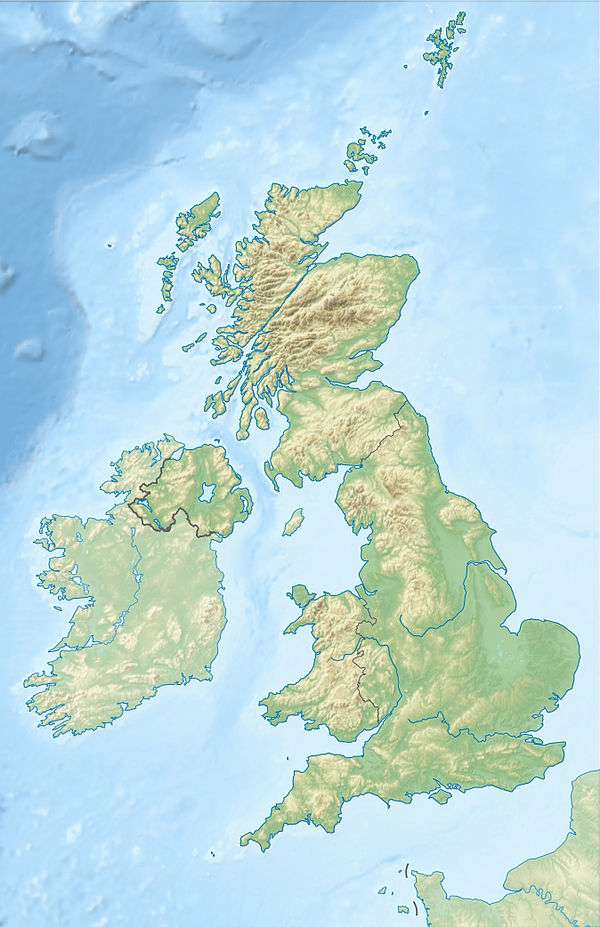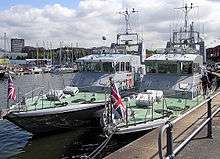University Royal Naval Unit
A University Royal Naval Unit (URNU) is a Royal Navy training establishment connected to a university, or a number of universities concentrated in one area. There are 15 URNUs nationwide in the UK, and each URNU has land-based facilities near the university in question, up to four training officers (members of the Royal Naval Reserve) and, with the exception of Devon, a dedicated training vessel (an Archer-class P2000 fast patrol boat).[1]
 |
| Her Majesty's Naval Service of the British Armed Forces |
|---|
| Components |
|
|
| History and future |
| Ships |
| Personnel |
|
|
| Auxiliary services |
Units and ships


| Unit | Date Established | Ship | Home Port | Unit Location |
|---|---|---|---|---|
| Edinburgh | 1968 | Archer | Leith | Hepburn House, Edinburgh |
| Glasgow & Strathclyde | 1972 | Archer | HMNB Clyde | Glasgow University |
| Liverpool | 1972 | Liverpool | Headquarters Naval Regional Command Northern England | |
| Southampton | 1972 | Blazer | HMNB Portsmouth | National Oceanography Centre, Southampton |
| Birmingham | 1984 | Exploit | HMNB Portsmouth | HMS Forward |
| London | 1985 | Puncher | HMNB Portsmouth | HMS President |
| Bristol | 1986 | HMNB Devonport | HMS Flying Fox | |
| Manchester & Salford | 1986 | Biter | Liverpool | University Barracks, Manchester |
| Sussex | 1990 | Ranger | HMNB Portsmouth | University of Brighton |
| Cambridge | 1994 | Trumpeter | Ipswich | Cambridge |
| Northumbria | 1994 | Example | HMS Calliope, Gateshead | HMS Calliope |
| Oxford | 1994 | Smiter | HMNB Portsmouth | Falklands House, Oxford |
| Wales | 1994 | Express | Penarth Marina, Cardiff | HMS Cambria |
| Yorkshire | 1994 | Explorer | Kingston-upon-Hull | HMS Ceres |
| Devon | 2017 | N/A | HMNB Devonport | HMS Vivid |
URNU ships are part of the Costal Forces Squadron, or "CFS". CFS is commanded by Commander CFS, who previously was also Commander URNU, Commander Universities now being aseparate post. The mission statement of CFS is to provide high-quality sea training experiences in support of the URNU mission and to deliver P2000 operational capability in support of other fleet tasking.[2]
The most recently formed unit, Devon URNU was established in 2017, catering to universities across the region. The unit is the only URNU without a dedicated training vessel, but students are able to utilise available P2000s and other craft for training.[3] Devon was the first new unit formed since 1994.
Membership
While the URNUs are commanded by Commander URNU they fall under the overall jurisdiction of Captain BRNC (the Commanding Officer of Britannia Royal Naval College), Dartmouth. Each URNU is commanded by a Lieutenant RN, Lieutenant Commander or RM Captain, and is associated with a P2000 patrol boat of the Coastal Forces Squadron, formerly the 1st Patrol Boat Squadron.[4]v Each URNU comprises 51 undergraduates who join for the duration of their degree, with the option of taking years out or leaving at any time.
Undergraduates join for three years, or in some cases the duration of their course. Members hold the rank of honorary Midshipman in the Royal Naval Reserve. A notable difference between this and other ranks in the Royal Navy is that there is no call-up liability and members may leave at any time.
During the first year URNU students wear URNU slides on their shoulders and are Officer Cadets (O/CDTS) and on completion of their first URNU taskbook they receive a white officer cadet tab in addition to the URNU slide. They can then be referred to as Officer Cadet OC RNR and on completion of the second taskbook students will wear Midshipman rank slides and "turnbacks" and be referred to as Midshipmen RNR(MID).
Each URNU has a Senior Midshipman (SMID) and Deputy Senior Midshipman (DSMID) with a committee made up of various roles which differ according to unit, but will generally include a treasurer and sports and adventurous training officers alongside other roles, and this committee will take leading role in programme planning and assist in the running of the Unit. The committee is supported by the unit CO and a Coxn, usually a full-time Royal Navy Chief Petty Officer (CPO) as well as a civilian secretary. Each unit also has capacity for up to four training officers, who may be ex-Navy, former URNU students, or civilians with relevant experience, who are appointed as Royal Naval Reserve officers (RNR).[5]
Training and Unit Life
_-_at_HMS_Calliope_-_Gateshead_-_14082004.jpg)
Training focuses on leadership, navigation and seamanship, and this is put into practice during sea weekends, and longer deployments during the summer and Easter vacations. Drill nights also often include lessons on wider navy knowledge, drill practice, and visits from serving personnel and affiliated units as well as practical leadership tasks and team building. Units also frequently undertake visits to affiliated units and local training establishments to experience military life first hand. Training is assessed via successive taskbooks which must be signed off by members of the unit staff or P2000 ships company. Advancement in rank depends on completion of each taskbook.
There is also a significant and important social element to URNU life from formal mess dinners including the main naval formal event of the year, Trafalgar Night, to informal socialising in the unit's mess and dedicated socials which contribute to unit integration and may be coordinated by a dedicated social secretary.
There are sporting activities held within the URNU units, informal contests between the units and an annual sports weekend in Portsmouth between all units, organised by the losing unit from the previous year.
See also
- University Officer Training Corps, the British Army equivalent
- University Air Squadron, the Royal Air Force equivalent
References
- "University training | Royal Navy". www.royalnavy.mod.uk. Retrieved 2017-03-17.
- "Patrol boats | Royal Navy". www.royalnavy.mod.uk. Retrieved 2017-03-17.
- "Devon University Royal Naval Unit launched | Royal Navy". www.royalnavy.mod.uk. Retrieved 2017-03-17.
- "Coastal Forces Squadron" (PDF). whatdotheyknow.com. Whatdotheyknow.com. 6 July 2020. Retrieved 16 July 2020.
I can confirm that Ministerial approval for the change in name from 1st Patrol Boat Squadron to Coastal Forces Squadron was given on 21 May 2020.
- BR 3 (2) Chapter 25 - Volume 2 - The University Royal Navy Units. London: Royal Navy media office. 2016.
